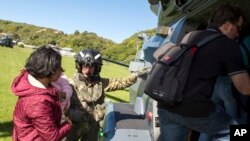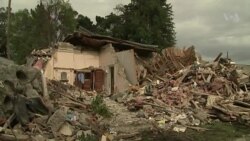Two New Zealand navy vessels on Wednesday reached a small South Island town cut off for more than two days by a devastating earthquake, bringing supplies of food and water and plans to evacuate hundreds of stranded tourists and residents.
Prime Minister John Key went to Kaikoura by helicopter to inspect damage to roads that cut off the seaside tourist town after the 7.8 magnitude tremor that struck just after midnight Sunday.
The government was expecting to receive satellite imagery later Wednesday to assess massive landslides around the country. The quake buffeted much of central New Zealand and left two people dead.
"Look at this road here," Key said on his journey to Kaikoura, around 150 kilometers [90 miles] north of Christchurch. "I just don't see how you can ever repair that bit of road. The whole mountain has moved over."
Slides trap train
Pictures shared on social media showed large sections of rocky coast covered in seaweed and abalone, apparently lifted out of the sea by the force of the quake. Huge landslides covered access roads and rail routes. One train was caught between two slides.
The HMNZS Wellington was surveying the harbor area at Kaikoura to ensure that it was safe for vessels, Civil Defense director Sarah Stuart-Black told reporters.
Officials said more than 400 people had been evacuated by helicopters from Kaikoura, including a dozen who were injured.
"Between 700 and 1,000 people still require evacuation," Stuart-Black said. Kaikoura is a popular base for whale watching.
New Zealand lies in the seismically active "Ring of Fire," a 40,000-kilometer arc of volcanoes and oceanic trenches that encircles much of the Pacific Ocean.
Christchurch is still recovering from a 6.3 magnitude quake in 2011 that killed 185 people.
More ships
Another five ships were steaming to Kaikoura, including the USS Samson. The Samson, the first U.S. warship to visit the South Pacific nation in three decades, and Australian, Canadian and Japanese ships were on hand in Auckland for celebrations of the Royal New Zealand Navy's 75th anniversary.
Until an agreement reached last month, U.S. military ships had been prevented from visiting New Zealand because of the country's nuclear-free stance adopted in the 1980s.
U.S. President-elect Donald Trump spoke with Key on Wednesday to express his sympathies over the earthquake.
"They discussed the New Zealand economy, trade and agreed that the relationship between New Zealand and the United States was in great shape," Key's office said in a statement.
Hundreds of stranded tourists have been housed in the communal halls of Kaikoura's indigenous Maori Ngai Tahu tribe and fed with crayfish, a famed food of the South Island town.
Marine life
One commercial fisherman said the quake has had a devastating effect on Kaikoura's marine life and it could take years for shellfish stocks to bounce back.
Jason Baker, a paua, or sea snail, diver, was part of a team sent to assess the damage. He said the seabed had risen up to six meters in some areas, exposing thousands of paua, crayfish, butterfish and other sealife.
"I sort of came away from it feeling sick, to be honest," Baker told RNZ. "It's just changed the environment forever. ... It's going to affect people's livelihoods."
In the capital, Wellington, officials are to decide within days whether a multistory building damaged in the quake and strong aftershocks would have to be brought down.








